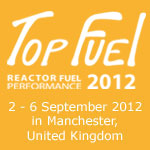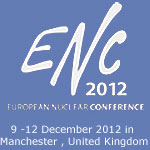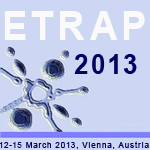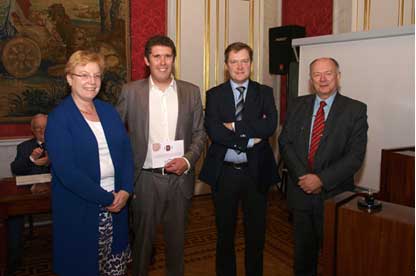
Dr. Sebastien Couet (KUL) wins the SCK•CEN Prof. Roger Van Geen Scientific AwardAt the initiative of the Belgian Nuclear Research Centre, SCK•CEN, and the Fund for Scientific Research Fonds National de la Recherche Scientifique, FNRS in French, and the Fonds Wetenschappelijk Onderzoek, FWO, in Dutch), the biennial SCK•CEN Professor Roger Van Geen Scientific Award is presented. This award, for which the winner receives 12,500€, recognises a research project that has provided an original contribution to or achieved important progress in an area of SCK•CEN expertise. The study must be at a post-doctoral level and should not have previously won an award. It is reserved for an individual project that has been submitted by researchers from a Belgian university, or from another research institution other than SCK•CEN. The prize this year was presented at the Royal Flemish Academy of Belgium, on 19 March, by Melchior Wathelet, Secretary of State for Environment, Energy and Mobility, in the Belgian government.
Dr. Sebastien Couet won the award for his research project entitled: A Study of the magnetic and dynamic properties of nanoscale systems by nuclear resonant scattering. Dr. Couet developed a "special" nuclear analysis technique, i.e., that of nuclear scattering. Many phenomena in solid state physics can be studied using this technique. In order to gain an insight into the behaviour and interaction of the individual components of electronic equipment, macroscopic measurement methods e.g. no longer suffice. The measurement must be carried out at a nanoscale level, because we are dealing with the measurement of objects no more than a few atoms in size. The experiment was carried out at the European Synchrotron Radiation Facility (ESRF) in Grenoble, France. Nuclear technology, and in particular the method of nuclear resonant scattering, is a unique way of visualising this interaction in a non-destructive manner. This study may also lead to the development of superconductive materials. Below is a CV of Professor van Geen, who gave his name to the prize. Prof. Roger Van Geen (1935 - 1995): a CVProfessor Roger Van Geen obtained a Masters in Physics and a Doctor of Sciences at the ULB (Université Libre de Bruxelles, or “Free University of Brussels”). He later became a full-time professor and Dean of the Faculty of Science and Applied Science at the VUB (the Dutch-speaking Vrije Universiteit Brussel, where he was appointed Rector in 1974. The Academic Hospital of the VUB was inaugurated under his rectorship. He also decided to build an oncology centre and a children’s hospital. Professor Van Geen became a member of the board of SCK•CEN in 1975 and its Managing Director in 1989. From 1991 onwards, he was Chairman. He has left an indelible mark on the scientific achievements of SCK•CEN and made an important contribution to the development of a large network of international relationships. He also built bridges between the world of politics and the humanities.
|
||||||||
|
|




